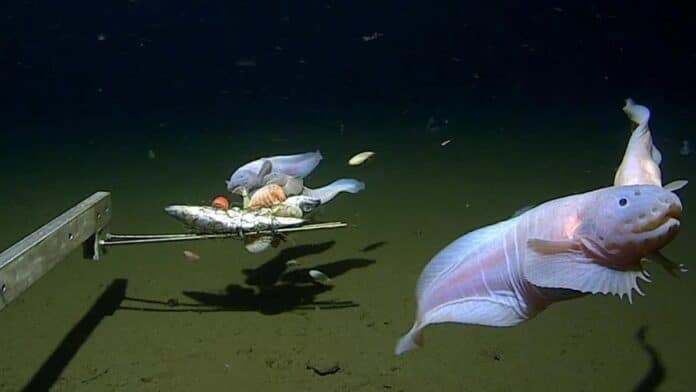A joint scientific expedition by the University of Western Australia and the Tokyo University of Marine Science breaks record for deepest fish captured and filmed. The catch of the deepest-ever fish, a snail-fish, happened in the Iza-Ogasawara Trench, south of Japan.
The team set traps 8,022 meters underwater, more than 5 miles beneath the ocean’s surface, in the Japan Trench, and caught the snail-fish during a two-month voyage. The previous record for the deepest fish was set in 2014 when another team caught a fish at a depth of 8,178 meters in the Mariana Trench.
Deepest Fish Captured and Filmed
The catch was made by setting traps that contained bait in order to attract the snail-fish. The traps were then collected using a remote-operated vehicle (ROV) which brought the snail-fish to the surface for study. The two snail-fish caught by the expedition were around 71mm and 92mm in length. The team was also able to film the snail-fish at a depth of 8,336 meters using the ROV, a new record for filming at such depths.
The deepest fish named, The Snail-fish
Snail-fish are commonly found at great depths and are known for their adaptability to extreme environmental conditions. They have a soft, scaleless body, and their translucent skin provides camouflage in the dark depths of the ocean. Snail-fish are often seen scavenging for food on the seafloor and have been found to feed on shrimp, small fish, and crustaceans.
The Expedition Team
The expedition was led by Professor Alan Jamieson, Chief Scientist at The Institute of Oceans and the School of Biological Sciences in the University of Western Australia. Professor Jamieson has been leading expeditions to the deepest parts of the ocean for over a decade and has made several groundbreaking discoveries during his career.
The team included researchers from the University of Western Australia, the Tokyo University of Marine Science and Technology, and Armatus Oceanic, a deep-sea exploration company.
The Importance of Deep-Sea Exploration
Deep-sea exploration plays a crucial role in our understanding of the ocean and its biodiversity. The deepest parts of the ocean are home to many unique and often unknown species that have adapted to survive in extreme environments.
The exploration and study of these species can provide valuable insights into the evolution of life on Earth and can also help us to understand the impacts of human activities on the ocean.
The joint Australian-Japanese expedition has successfully set a new record for the deepest-ever fish caught and filmed. The discovery of the snail-fish provides valuable insights into the biodiversity of the deep ocean and highlights the importance of continued deep-sea exploration.
As technology continues to advance, we can expect further breakthroughs in our understanding of the ocean and the life that inhabits it.

